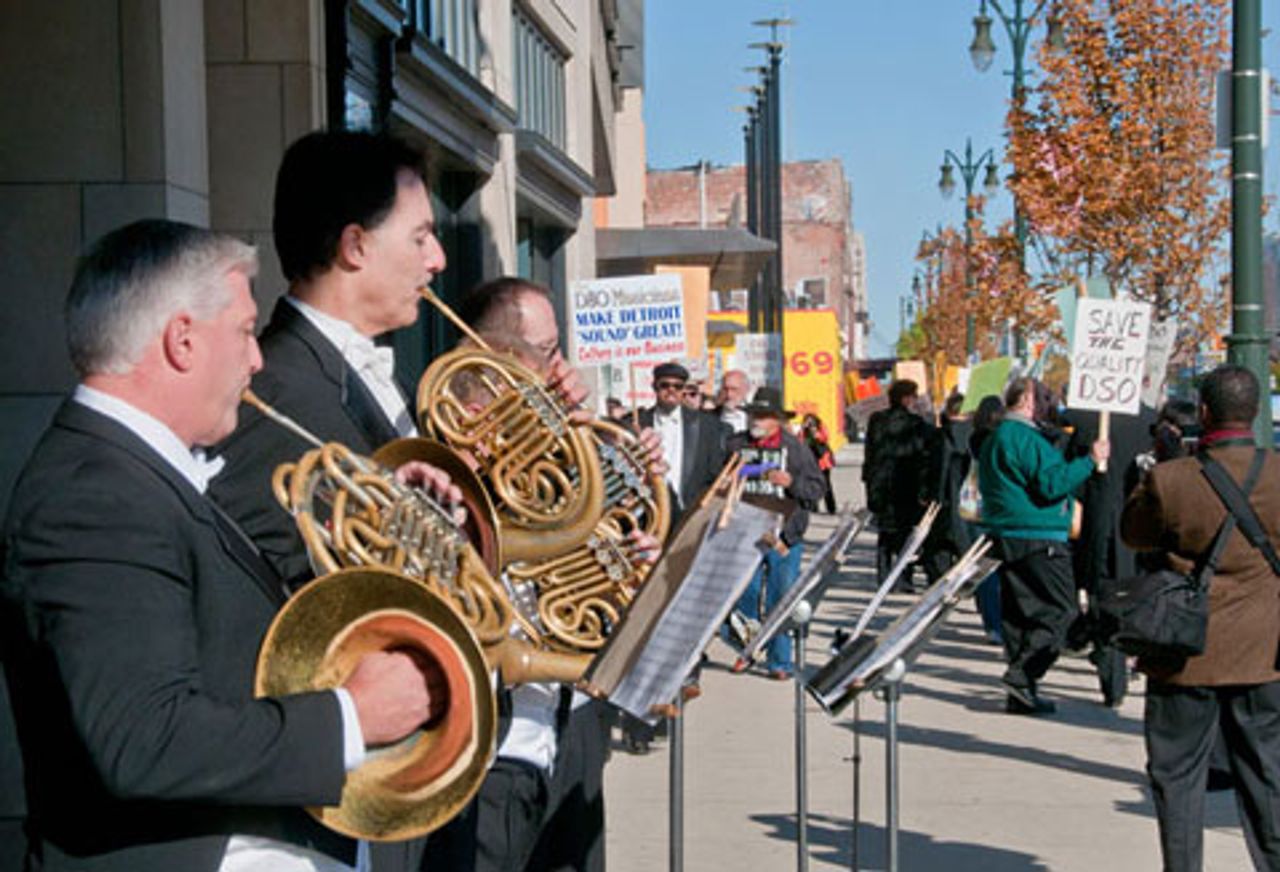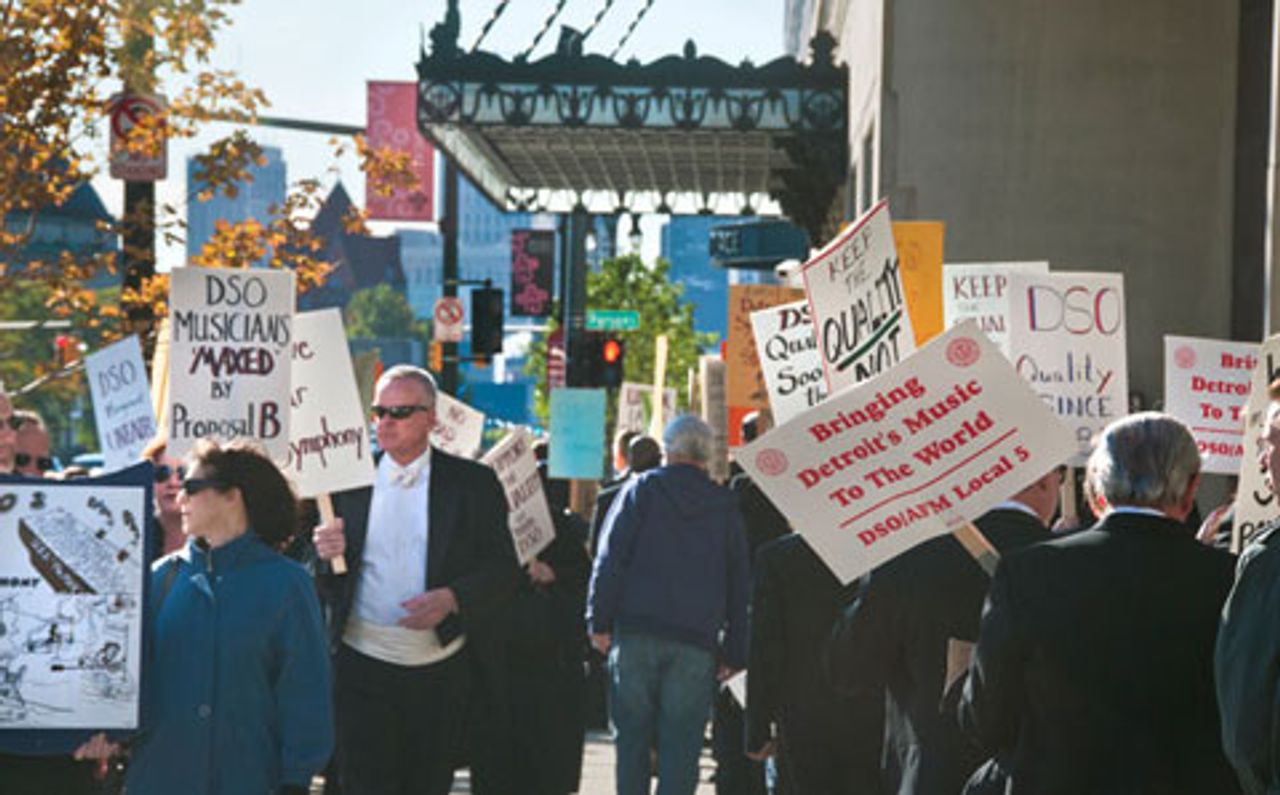The opening of the 2012-2013 concert season has seen a series of lockouts and concession contracts at major symphony orchestras across the US. Musicians in Chicago, Atlanta and Indianapolis have had givebacks imposed on wages or benefits. In Minneapolis, St. Paul, Seattle and Jacksonville, Florida major concessions have also been demanded.
 The Detroit Symphony Orchestra musicians on the first day of their six-month strike
The Detroit Symphony Orchestra musicians on the first day of their six-month strikeIt is clearer than ever that the bitter six-month strike at the Detroit Symphony Orchestra that began October 4, 2010 was a test case for orchestra managements and their wealthy trustees around the country. Soon after the Detroit musicians were forced back with substantial concessions in 2011, the Philadelphia Orchestra sought bankruptcy protection and later forced its own round of concessions on its musicians.
 The DSO musicians on the picket line
The DSO musicians on the picket lineThe orchestras in smaller and medium-sized cities, lacking big endowments or as many millionaire patrons, have been most insistent that their musicians pay for growing budget deficits by accepting huge cuts in pay.
Management has been more than willing to use the lockout tactic. Following the lead set by such employers as Con Edison this past summer, Cooper Tire last fall and the ongoing lockout of the National Hockey League players, orchestras in Atlanta, Indianapolis and Minneapolis have all locked out their musicians in the last month.
In the case of the Atlanta Symphony Orchestra (ASO), a lockout began on August 27 and ended on September 26 with the musicians’ union accepting management demands, including a 17 percent pay cut in the first year of a two-year contract and an additional 14 percent pay cut in the second. In a show of “equal sacrifice,” top administrators accepted pay cuts of 6 percent.
The ASO is not one of the most famous American orchestras, but has become increasingly well known in recent years under music director Robert Spano, who arrived in 2001 after some years heading the Brooklyn Philharmonic.
The number of Atlanta musicians is now being reduced from 95 to 88, and the orchestra season is being cut from a full 52 weeks to 42. The musicians’ base salary will now be about $73,000 annually. As far as “equality of sacrifice,” ASO President and CEO Stanley Romanstein’s pay cut of 6 percent comes off $314,000 a year, more than four times the musicians’ base pay.
At the Indianapolis Symphony, another ensemble in a mid-sized city, the largest in the state of Indiana, a lockout began on September 10 and ended more than a month later with the musicians accepting a whopping 32 percent pay cut. The $11.5 million concessions contract will reduce annual pay from $78,000 to $53,000, with pay to gradually increase to $70,000 over the five years of the agreement. At the same time, negotiations are continuing over additional concession demands on pensions and other issues.
Lockouts are continuing in the Twin Cities of Minneapolis and St. Paul. The Minnesota Orchestra, another ensemble that has become more widely known and respected in recent years under the direction of Finnish conductor Osmo Vanska, is demanding 35 percent in pay cuts. The musicians have pointed out that management is spending $52 million on the renovation of Orchestra Hall while claiming there is no money. Management has replied that those donations are earmarked expressly by donors and cannot be used on salaries.
The St. Paul Chamber Orchestra, a smaller group known for its appearances on public radio over the years, is demanding $1.5 million in “labor savings” and locked out its musicians on October 22. Concerts have been cancelled through at least November 4.
This is only a partial list. The Jacksonville Symphony musicians are being told they must accept a 20 percent pay cut, and in Baltimore pay has been cut by 27 percent in the past few years. The Delaware Symphony shut down for several months and then announced an abbreviated season that will mean pay cuts, while negotiations proceed on a new three-year contract. On the West Coast, the Seattle Symphony is demanding pay cuts of 15 percent, and a strike was averted for now by an interim contract extension through January 31 of next year.
The concession demands have not spared the most prestigious orchestras, the so-called “Big 5” of Boston, New York, Philadelphia, Cleveland and Chicago. These ensembles, whose history goes back to the 19th century or the very early years of the 20th, became especially world-renowned in the post-World War II years that saw the emergence of long-playing records.
Today, the Philadelphia Orchestra has recently emerged from bankruptcy after imposing major concessions on its players, and the Chicago musicians went on strike for three days in late September before settling for a contract in which small pay increases will be more than eaten up by higher health care costs. In New York, a contract agreement announced last January essentially postponed a confrontation on concessions for a short time, until next fall.
Musicians are reacting with growing anger to the unending series of concessions
contracts and the precariousness of their jobs and the musical culture to which they have devoted themselves.
Some of this anger is reflected in a recent column by the music critic of the Philadelphia Inquirer, Peter Dobrin. Dobrin writes of the “deep resentment” among Philadelphia Orchestra musicians, and questions a situation in which “a country of 313 million … can’t find a way for a little more than 2,000 musicians to make enough money to exist without moonlighting. The free market system may or may not be wise, but it is so far deaf to this question.”
Dobrin explains that, far from most orchestra musicians enjoying six-figure salaries, much more typical is the compensation of the members of the Alabama Symphony, scheduled to reach a base pay of $39,485.90 annually in 2014. For the Buffalo Philharmonic, it is just slightly higher, at $43,134.
The “free market system,” however, is not “deaf” to the question of decent pay for orchestra musicians, as the Philadelphia critic suggests. It is proceeding quite deliberately with the destruction of the living standards of musicians just as it has attacked the living standards of teachers, transit workers, auto workers and millions of others.
The lesson of the Detroit Symphony strike and the subsequent assaults on musicians must be learned. It is not possible to resist concessions one orchestra at a time, by appealing to the supposed consciences of wealthy patrons, or for that matter by confining this struggle to musicians and other professionals. The entire system of musical education and culture must be overhauled on the basis of human needs. It must be part of a political fight against the profit system and for a socialist program.
The author also recommends:
Philadelphia Orchestra files for bankruptcy protection
[18 April 2011]
The Detroit Symphony strike and the defense of culture in the US
[18 November 2010]
